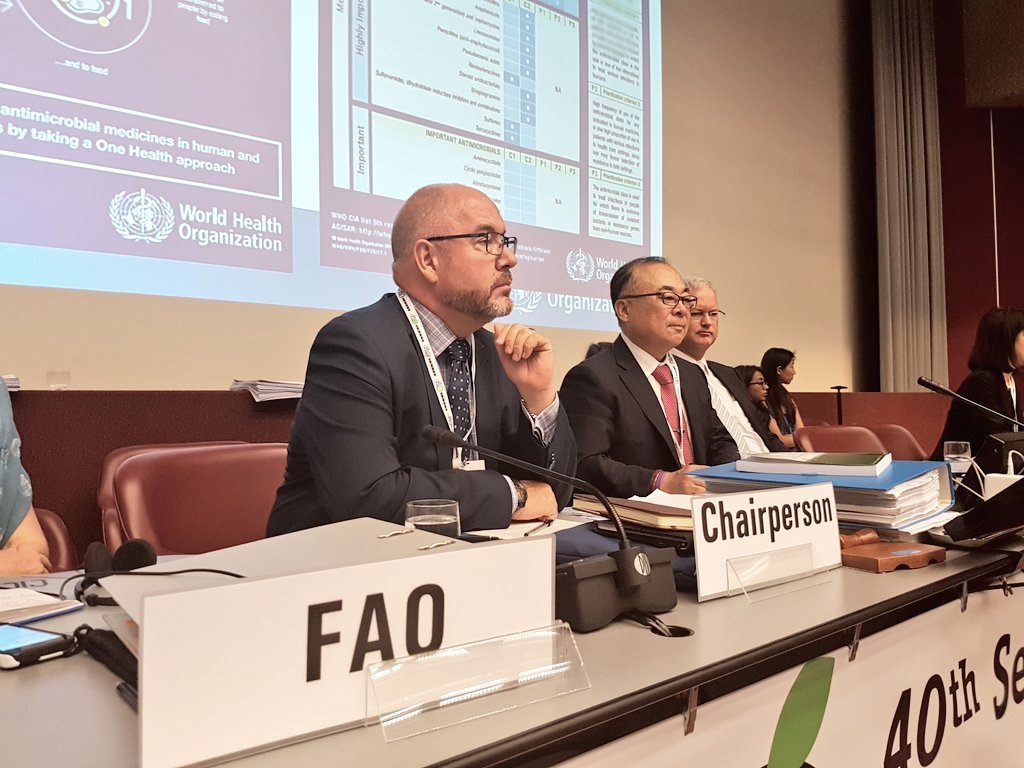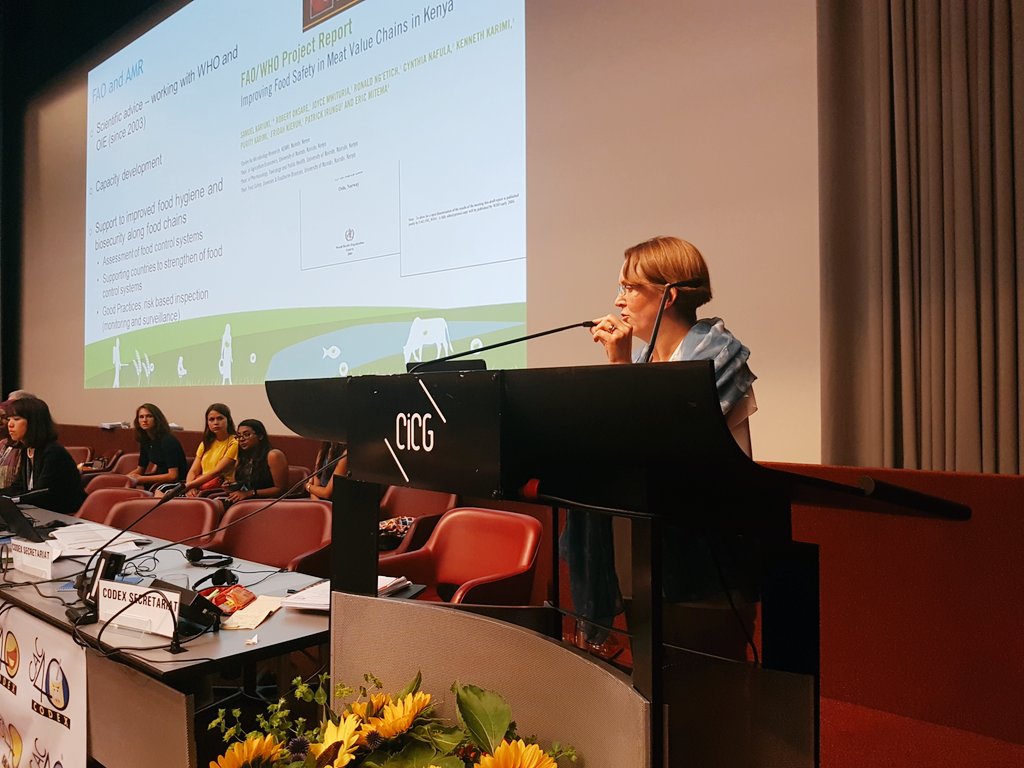Codex and AMR: from commitment to action
Three international organizations called for increasing efforts towards reducing foodborne antimicrobial resistance (AMR) at a side event at the 40th Session of the Codex Alimentarius Commission.
Representatives of the three organizations that make up the Tripartite collaboration on AMR – the Food and Agriculture Organization of the United Nations (FAO), the World Health Organization (WHO) and the World Animal Health Organisation (OIE) – spoke in favor of the “One Health” approach, each from their own perspective on food and agriculture, human health and animal health.
There is increasing consensus that unecessary use of antimicrobials in agriculture is a considerable concern.
Steve Wearne

Opening the event, Dr. Steve Wearne, Director of Policy at the UK Food Standards Agency, mentioned the Global Action Plan on AMR adopted by the World Health Assembly in 2015, and endorsed by FAO and OIE governing bodies. The objectives of the action plan are to: increase awareness and understanding of AMR; strengthen the knowledge and evidence base through surveillance and research; reduce the incidence of infection through effective sanitation, hygiene and infection prevention measures; optimize the use of antimicrobial medicines in human and animal health (e.g. WHO Essential Medicines List); and ensure sustainable investment.
All panelists recognized the importance of high-level political support and engagement on AMR, and welcomed the recent G20 Declaration, including a paragraph on AMR for the first time in history.
Marc Sprenger, Director of AMR Secretariat at WHO, citing World Bank data, pointed out that low-income countries are the most affected by AMR. While recognizing that AMR will affect several UN Sustainable Development Goals, he highlighted that developing national action plans including multi-sectorial approaches is essential. Awa Aidara-Kane recalled the long-term WHO commitment on AMR, starting from Berlin in 1997, followed by the WHO global principles, the Tripartite consultations in 2003 and 2004, the Codex Task Force on AMR that met in 2007 for the first time, but also the 2015 Global Action Plan on AMR and the establishment of the second Codex Task Force on AMR in 2017. The UN General Assembly, recognizing the magnitude of this global problem, has also established an AMR Inter-Agency Coordination Group.

We need to collect information on AMR along the food chain.
Sarah Cahill
Sarah Cahill explained that one of the areas FAO is working on is to strengthen governance by reviewing animal and plant health legislations guidelines, and supporting capacity development at the country level. She also informed that legal information on AMR is being included in FAOLEX, and stressed the importance of sharing good practices in agriculture production systems and in the food control area, as well as to develop partnerships with producers and industry.
Gillian Mylrea, representing the OIE, recalled that collaboration is crucial at all levels. She also presented the OIE strategy on AMR and the prudent use of antimicrobials, including the importance of implementing relevant international standards.
All speakers highlighted the importance of raising awareness on AMR, supporting capacity building and the development of national action plans, with a focus on implementing the Global Action Plan on AMR.
It was recognized that the over-use of antimicrobial agents in agricultural production is a matter of fact and a significant concern to the global community, and that food distribution is a probable yet still theoretical pathway of antimicrobial resistance.
Countries like Kenya and the Philippines said that they had developed national action plans to tackle AMR and acknowledged the FAO support in developing them.
Prof. Park from the Republic of Korea and Chairperson of the new Codex Task Force on AMR presented the work ahead until 2020, including the revision of the Code of practice to minimize and contain AMR and the Guidance on integrated surveillance.
“Healthy animals, and especially safe and healthy food make happy people” he concluded.
Watch the recording of this side event here.
Mirko Montuori
At the heart of the Codex mandate are the core values of collaboration, inclusiveness, consensus building and transparency. Governmental and non-governmental, public and private organizations alike play a vital role in ensuring Codex texts are of the highest quality and based on sound science.
Codex would have little authority in the field of international standard setting if it did not welcome and acknowledge the valuable contributions made by observers. Expert technical bodies, industry and consumer associations
contribute to the standard-setting process in a spirit of openness, collaboration and transparency.
Intergovernmental organizations (IGOs) and international non-governmental organizations (NGOs) can apply for observer status in Codex in order to attend and put forward their views at every stage of the standard-setting process.
 Current Codex Alimentarius Commission
Current Codex Alimentarius Commission
Codex and AMR: from commitment to action
Three international organizations called for increasing efforts towards reducing foodborne antimicrobial resistance (AMR) at a side event at the 40th Session of the Codex Alimentarius Commission.
Representatives of the three organizations that make up the Tripartite collaboration on AMR – the Food and Agriculture Organization of the United Nations (FAO), the World Health Organization (WHO) and the World Animal Health Organisation (OIE) – spoke in favor of the “One Health” approach, each from their own perspective on food and agriculture, human health and animal health.
There is increasing consensus that unecessary use of antimicrobials in agriculture is a considerable concern.
Steve Wearne

Opening the event, Dr. Steve Wearne, Director of Policy at the UK Food Standards Agency, mentioned the Global Action Plan on AMR adopted by the World Health Assembly in 2015, and endorsed by FAO and OIE governing bodies. The objectives of the action plan are to: increase awareness and understanding of AMR; strengthen the knowledge and evidence base through surveillance and research; reduce the incidence of infection through effective sanitation, hygiene and infection prevention measures; optimize the use of antimicrobial medicines in human and animal health (e.g. WHO Essential Medicines List); and ensure sustainable investment.
All panelists recognized the importance of high-level political support and engagement on AMR, and welcomed the recent G20 Declaration, including a paragraph on AMR for the first time in history.
Marc Sprenger, Director of AMR Secretariat at WHO, citing World Bank data, pointed out that low-income countries are the most affected by AMR. While recognizing that AMR will affect several UN Sustainable Development Goals, he highlighted that developing national action plans including multi-sectorial approaches is essential. Awa Aidara-Kane recalled the long-term WHO commitment on AMR, starting from Berlin in 1997, followed by the WHO global principles, the Tripartite consultations in 2003 and 2004, the Codex Task Force on AMR that met in 2007 for the first time, but also the 2015 Global Action Plan on AMR and the establishment of the second Codex Task Force on AMR in 2017. The UN General Assembly, recognizing the magnitude of this global problem, has also established an AMR Inter-Agency Coordination Group.

We need to collect information on AMR along the food chain.
Sarah Cahill
Sarah Cahill explained that one of the areas FAO is working on is to strengthen governance by reviewing animal and plant health legislations guidelines, and supporting capacity development at the country level. She also informed that legal information on AMR is being included in FAOLEX, and stressed the importance of sharing good practices in agriculture production systems and in the food control area, as well as to develop partnerships with producers and industry.
Gillian Mylrea, representing the OIE, recalled that collaboration is crucial at all levels. She also presented the OIE strategy on AMR and the prudent use of antimicrobials, including the importance of implementing relevant international standards.
All speakers highlighted the importance of raising awareness on AMR, supporting capacity building and the development of national action plans, with a focus on implementing the Global Action Plan on AMR.
It was recognized that the over-use of antimicrobial agents in agricultural production is a matter of fact and a significant concern to the global community, and that food distribution is a probable yet still theoretical pathway of antimicrobial resistance.
Countries like Kenya and the Philippines said that they had developed national action plans to tackle AMR and acknowledged the FAO support in developing them.
Prof. Park from the Republic of Korea and Chairperson of the new Codex Task Force on AMR presented the work ahead until 2020, including the revision of the Code of practice to minimize and contain AMR and the Guidance on integrated surveillance.
“Healthy animals, and especially safe and healthy food make happy people” he concluded.
Watch the recording of this side event here.
Mirko Montuori
 Codex and Observer
Codex and Observer
around the world since ancient times.
We might not always know where it comes from,
but we expect it to be available, safe and of good quality.











Leave a comment